Arbuthnot Banking Group plc (LON:ARBB) Chief Operating Officer Andrew Salmon and Group Finance Director James Cobb caught up with DirectorsTalk for an exclusive interview to discuss interim results, Future State 2 strategic plan, dividend payments, specialist lending divisions, growth in Funds under Management, and the increase in customer deposits.
Q1: Andrew, the interims seemed a good set of solid results, could you just take us through the highlights?
A1: Yes, we’re delighted with the results, making just over £20 million in the first six months.
In particular, why is the group prospering? Well, the overall strategy for people who aren’t familiar with the group is Arbuthnot Latham is primarily a private and commercial bank concentrating on service and strong relationship banking. This is proving to be a very strong business model, we seem to be having no problem attracting a strong flow of new business.
So, the important thing is having attracted a strong flow of new business, can the business make a good return for shareholders? This six-monthly result shows that we can.
The results were actually slightly less than they were last year, but this has been flagged well in advance because last year’s results were flattered by not higher interest rates, but rising interest rates. Clearly, we’ve now had interest rates until very recently at the rate of 5.25% for quite some time, whereas in the previous year, the rates rose to 5.25% and flattered the profits.
We’re now making a good return on capital, we’re growing not only the core business of private and commercial banking strongly, but James will talk in a moment about the three subsidiaries where we’re concentrating the allocation of our capital in order to get the higher returns and diversify the business more strongly.
Alongside stronger lending growth and stronger profitability, we’ve also been growing our Assets under Management as part of the private bank, and compared to our peer group, we’re extremely proud of the fact that Assets under Management are growing organically at a very substantial pace.
Q2: James, in the results, you mentioned the Future State 2 strategic plan. Can you tell us more about that?
A2: When we were locked down during COVID, we actually developed our Future State 1 plan and once we emerged from COVID, we actually achieved that plan quite quickly afterwards so we had another revision of it.
In essence, what it is, is a medium term strategic plan. We set it out in our investor presentation that was published in March earlier this year so you can go and find it there. However, the point behind it is that what we’re trying to do is to indicate how that we will allocate the capital that the group has today, and the capital that we will generate over the medium term. Once that capital has been allocated, once that capital has been generated, how we’re going to allocate it to our lending divisions.
Andrew has mentioned that we’ve been growing strongly in our subsidiary and specialist lending businesses and you’ll see that in that strategic plan, how we allocate the capital for those businesses to become much more significant in terms of our lending portfolios.
That’s pretty important because that helps to drive higher margins, but it also therefore allows us to target a 15% return on capital at a pre-tax level when all that capital has been allocated.
Q3: The results, Andrew, they refer to an interim dividend and also a special dividend, both of 20p per share. Could you tell us more about that?
A3: As I mentioned in answering the previous question, we had a particularly good year in the year of rising interest rates in 2023. If you look back at our history, we have a habit of when we have a particularly good year, of not only growing the dividend, but paying shareholders a special dividend so that they can share in that success. So, that is what we did in June.
As we were due to pay the interim dividend so shortly afterwards, we combined those two dividends to make a total of 40p a share, putting the company on a very high yield for the last 12 months.
Q4: Your specialist lending divisions grew by 12% in the first half, why is that so important?
A4: Well, as we just previously talked about the specialist lending divisions as part of the strategic plan, I’m going to tell you why that’s important to the overall profitability of the group.
First of all, I would like to point out that not only did they grow 12% in the first half, but they’ve also actually been growing at 29% in the previous 12 months, and that takes them up to a total of £861 million of total lending, which is now 36% of the total group’s portfolio of lending compared to 30% previously.
It’s important because the lending is higher margin, therefore that from our lower deposit cost base, we can earn higher net margins against that lending. It’s also fixed so in the declining rate environment that we’re probably entering now, those levels of margin should be maintained.
Also, it helps to diversify the bank’s portfolio of lending and therefore, we’ve not got all of our eggs in one basket.
Q5: Andrew, the Funds under Management, which you mentioned earlier, for your wealth management division, it grew by 43% in the last year. This is strong growth in a competitive market.
A5: Yes, we’re proud of the growth in the Assets under Management because if you look across the peer group of other wealth managers, this level of organic growth is really not seen elsewhere. So, you have to ask, why are we seeing this growth?
The answer is back to the service and relationship. People come to Arbuthnot Latham because they can deal with an individual relationship manager and get that personal service for something which is immensely important to them, being their savings, their pension, the wealth that they’ve created.
Above all, our investment managers have done what we’ve promised the clients and provided good performance, whereby their wealth is looked after and grows at a good pace.
All these things come together, a brand name that people trust in showing good development for that part of the business.
Q6: James, customer deposits, they increased by 19% in the year. It seems impressive, is there a reason for that?
A6: First of all, let’s just focus on the fact that a bank needs deposits to be able to grow its lending, because effectively, that’s what you’re doing is you’re lending out your deposits. So if we can’t, we’ve just talked about our ambitious growth targets for our lending, we don’t grow our deposits at the same rate, if not more, then we can’t continue to grow. So, it’s very important that we grow our deposit base.
More importantly, that the lower cost that we pay for those deposits means that we can be more competitive in our pricing on our lending, but also make the high margins that we talked about.
Now the growth has been very good across all of our sectors, in particular, the private bank and the commercial bank, but the commercial bank has stood out in terms of its growth in deposits.
It turns out that we have, as Andrew mentioned, a business model that seems to resonate with our clients and our customers and where we’re focusing our growth efforts is to grow our transactional banking in the commercial and SME space. These are the lowest cost, probably the highest service that we have to give.
Ultimately, if we keep growing that business, we can drive down the cost of our deposits and remain competitive.
Arbuthnot Banking Group PLC, trading as Arbuthnot Latham, provides private and commercial banking products and services in the United Kingdom. Founded in 1833, Arbuthnot Banking is based in London, United Kingdom.


